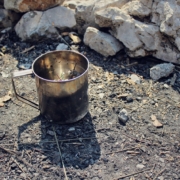Jubilee: A Coming Out of the Wilderness
Jubilee: A Coming Out of the Wilderness
Years ago, when my dad was stationed in Italy, I was blessed to be able to take part in Italy’s jubilee in 2000. I didn’t think I would get the opportunity again. Jubilees only come along every 25 years and I live far away from Italy now. When I stepped through St. Peter’s Holy Door in 2000, I never would have guessed that I would not only get to participate in Rome’s jubilee again, but that I would have a husband and three children in tow!
A jubilee is a time of forgiveness and spiritual renewal. The word jubilee means a time of celebration. We are celebrating God’s merciful love during a jubilee. Everyone is encouraged to participate, whether locally or through a pilgrimage to Rome and to receive the plenary indulgence. https://www.usccb.org/jubilee2025
When my husband first mentioned a possible trip to Italy for the Jubilee, I panicked. I’m a bit of an anxious person to put it lightly. All of the things that could possibly go wrong when bringing a family of five to Italy immediately filled my mind. I put our family on a strict “Don’t talk about the trip to Italy” notice in order to mentally avoid the inevitable. For the next several months, my husband quietly researched, planned, and bought tickets for our pilgrimage. I quietly brushed up on my Italian but stubbornly remained in denial.
In March, we landed in Venice and made our way through cities such as Siena, Assisi, and Florence, visiting many holy sites and preparing ourselves for the final stop in our pilgrimage – Rome. Italy, like America, has grown farther and farther away from God. It is hard to imagine the existence of a world where political – and even church– governance was heavily influenced by faith in the one, true God. This, however, is what the elaborate paintings in their government houses depict. God first, high above mankind, and all those below searching the Heavens and sometimes even pointing above in the realization that true governance comes from God.
That is what jubilees are about. An opportunity for us as individuals and, hopefully, as a society to renew our focus on God, His teachings, and His boundless love for all of us. Now, more than ever, the world needs this awakening. We need this hope.

Without this hope, however, I would never have even made it to Italy. Remember, I was so worried about all that could go wrong on the pilgrimage to Italy that I secretly preferred not to go at all. This was a grievous lack of trust in God on my part. Instead of turning to Him, instead of surrendering to Him, I almost missed out on a beautiful opportunity to allow my family a trip to the Holy City! I needed to surrender my heart to Him and ask Him to enter under my roof before I could enter under His.
This year’s jubilee calls us to be Pilgrims of Hope. Before I could even depart on this pilgrimage – I needed hope. As soon as this realization dawned, I was able to see this huge trip we would be undertaking as a just what it was meant to be – a pilgrimage. Pilgrimages are not easy. The first jubilee was decreed after the Israelites made it through 40 years of wilderness. Only after their desolate pilgrimage and only when they finally surrendered their stubbornness and made it to the Promised Land did the people enjoy their jubilee. “Proclaim liberty throughout all the land to all its inhabitants. It shall be a jubilee for you.” (Leviticus 25:10)
Looking back, I find it poignant that the hardest challenges for my family came prior to us even leaving and these challenges seemed to be allayed only when I surrendered and trusted the Lord with abandon. All at once, the wilderness cleared and our path to the Holy City unfolded.
Any pilgrimage we take during this jubilee year, whether to Italy or within our hearts, must start very close to home. Though I’m home now, my pilgrimage of hope should not be over. I’m to be an example to those around me of God’s loving mercy, at home and at work. This pilgrimage of hope starts in our heart. What does it benefit us to walk through the Holy Door at St. Peter’s if our heart is not as beautifully decorated as the basilica’s walls? Will I carefully place jewels of patience, love, and mercy into the altar of my heart? Will I perfume the chamber with oils of humility and kindness? When the Holy Doors close and the jubilee ends, how much more radiant will my heart be?
No matter where we find ourselves this jubilee year, let’s start with the heart. I plan to take time during daily prayer to look within and check on the progress within the basilica of my heart. Hopefully, at the end of this jubilee, I will be able to hand our Lord a heart I’ve done something to improve. All hearts can be like an ugly, rough stone, but each heart is greater than a precious jewel in the eyes of the Lord. With careful refinement, our hearts can shine like the beacons of hope God meant them to be. Let us renew our hope in Him and take up the pilgrim’s staff. God speed on your journey!

Copyright by Emily Henson 2025
Edited by Maggie Rosario

 Emily Henson
Emily Henson
 2025 by Margaret King Zacharias
2025 by Margaret King Zacharias






